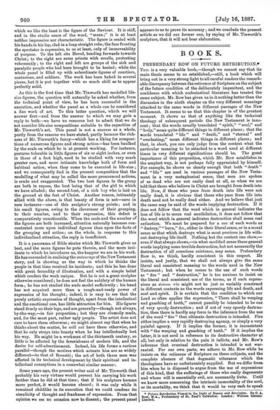BOOKS.
PREBENDARY ROW ON FUTURE RETRIBUTION.* Tuts is a very valuable book,—though we cannot say that its main thesis seems to us established,--still, a book which will bring out in a very strong light to all careful readers the remark- able discrepancy between the reticence of Scripture on the subject of the future condition of the deliberately impenitent, and the confidence with which ecclesiastical literature has treated the same subject. Mr. Row has given us in it nothing better than the discussion in the ninth chapter on the very different meanings attached to the same words in different passages of the New Testament. It seems to us that this chapter is of the greatest moment. It shows us that of anything like the technical theology of subsequent periods the New Testament is inno- cent; that the words usually translated "spirit," "soul," and "body," mean quits different things in different places ; that the words translated " life " and "death," and " eternal " and "everlasting," mean different things in different places; and that, in short, you can only judge from the context what tha particular meaning to be attached to a word used at different times in very different significations should be. The great importance of this proposition, which Mr. Row establishes in the amplest way, is not perhaps fully appreciated by himself. For example, he shows us clearly enough that both " death " and " life " are used in various passages of the New Testa- ment in a very metaphorical sense, that men are spokes of as dead who are not really dead at all, as when we are told that those who believe in Christ are brought from death into life. Now, if those who pass from death into life were not really dead, it is obvious that those who pass from life into death need not be really dead either. And we believe that just the same may be said of the words implying destruction. If it does not follow that the word which in general indicates the loss of life is to mean real annihilation, it does not follow that the word which in general indicates destruction shall mean real extinction. We must be prepared for a use of such words as " destroy," "burn," &c., either in their literal sense, or in a moral sense as that which destroys what is most precious in life with- out destroying life itself. Nothing but the context can show,— even if that always shows,—in what modified sense these general words implying some terrible destruction, but not necessarily the- destruction of all conscious existence, may mean. Prebendary Row is, we think, hardly consistent in this respect. He insists, and justly, that we shall not always give the same literal and consistent meaning to the words used in the New Testament ; but when he comes to the use of such words as " fire" and "destruction," he is too anxious to insist on the literal and consistent use of the terms, as if such expres- sions as dames u-Do might not be just as variably construed in different contexts as the words expressing life and death, and soul and spirit. It is certain that the condition to which our Lord 80 often applies the expression, "There shall be weeping and gnashing of teeth," cannot possibly be intended to be one of very speedy destruction ; and if not of very speedy destruc- tion, then there is hardly any force in the inference from the use of the word " fire " that ultimate destruction is intended. Fire either implies a very rapidly destroying agency, or simply a very painful agency. If it implies the former, it is inconsistent with "the weeping and gnashing of teeth." If it implies the latter, it is not used in reference to its destructive character at all, but only in relation to the pain it inflicts, and Mr. Row's inference that eventual destruction is intended is not war- ranted. For our own parts, we adhere to Mr. Row while he insists on the reticence of Scripture on these subjects, and the complete absence of that dogmatic utterance which the, theologians have so unfortunately supplied. But we differ from, him when he is disposed to argue from the use of expressions of this kind, that the sufferings of those who really degenerate and whose will is essentially evil, are necessarily finite. Until we know more concerning the intrinsic immortality of the soul, or its mortality, we think that it would be very rash to speak • Future 7/stribution Viewed is the Light of Reason and Revelation. By 0. A. Row. M.A., Prebendary of Bt. Paul's Cathedral. London: William 'abider Limited.






















































 Previous page
Previous page